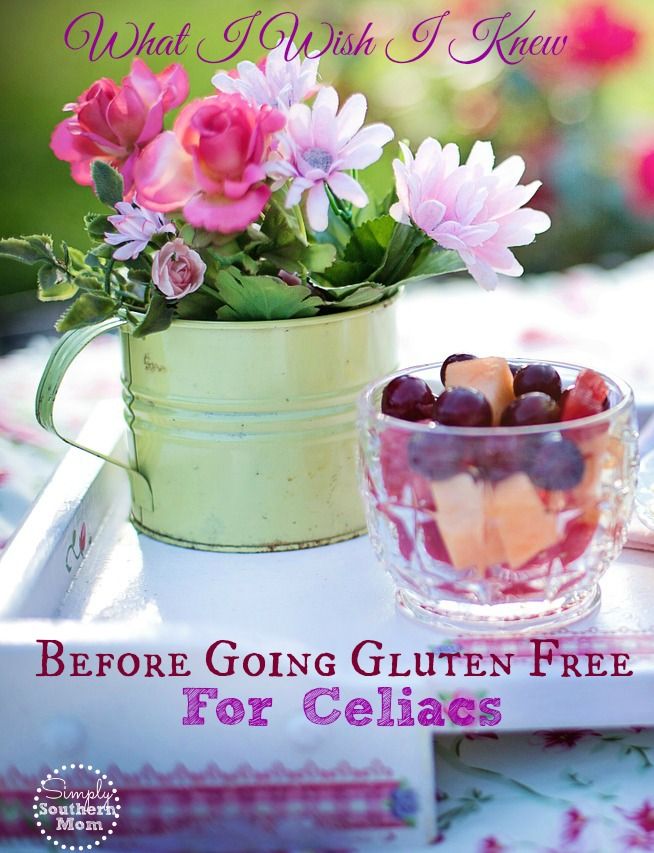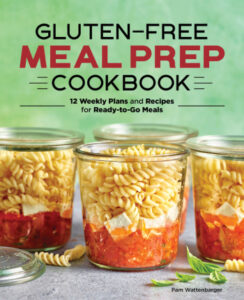Being diagnosed with Celiac Disease was a huge surprise. I had stomach troubles for years, but they never really seemed to add up to anything. We had tried low carb, we had tried lactose free, we had even spent time feeding me nothing but vanilla milkshakes and French fries because that’s all my body seemed to be able to handle. Getting the diagnosis was both a surprise and a relief. We finally knew why I had struggled with my weight and my health my whole life. But going gluten free? That was a huge hurdle. The gluten free world has changed immensely for the better since my diagnosis, but it can still be difficult to navigate. For the newly diagnosed or those newly avoiding gluten, it’s like a whole new world.

Luckily, over the years I have been able to connect with other celiacs both in person and offline to discover a gluten free lifestyle (because it’s totally a lifestyle, not just a diet) that works for me. Today, I’m sharing what I’ve learned as a veteran celiac that I wish someone would have told me from the start!
1. Check the ingredients on everything, every time.
Gluten hides in all kind of things, from frozen spinach at Trader Joe’s to bottled salad dressing. Even things that definitely don’t need gluten seem to be packed with it! Brands often change their recipes without warning, so even if you’ve been using a product for years, unless it has a certified gluten free label on it, you’ll need to read the ingredients. For example, in 2014, I had a celiac flare. No one could figure out what was going on! I even had to go to the doctor for a phenergan shot. The same day I went to the doctor, Justin made a surprising discovery: a spice packet we had been using for years (and that had been recommended by other people with Celiac Disease) suddenly included barley malt. It took me several weeks to recover from the accidental poisoning, and I learned my lesson.
2. Don’t be afraid to speak up.
This is a hard one for me, especially at restaurants or family gatherings. Asking someone to change their gloves before preparing your food or telling your family you need to grab your condiments before they can contaminate them is scary. Since some people think gluten free is just a fad, you always feel like you’re opening yourself up to judgment. Well, trust me, a little judgment from someone who doesn’t understand is better than days of “gluten gloom” and gastrointestinal symptoms! Speaking up for yourself is incredibly important, so you’ll want to get good at advocating for yourself. Educate loved ones and they can advocate for you too! My husband and mom are great at speaking up when I forget- or when I freeze up.
3. Go for naturally gluten free foods.
I will be the first to admit that I love convenience. I keep a stack of Aldi Live Gfree frozen macaroni meals in my freezer for those days when cooking just won’t cut it. Still, I feel better when I stick to unprocessed foods that are naturally gluten free. It’s a lot easier on the wallet too! Gluten free processed foods can get pretty pricey, so choosing rice instead of a specialty gluten free couscous can help save your budget. Some of my favorite naturally gluten free foods include rice, sweet potatoes, leafy greens, and citrus fruit. I keep mandarins around as long as they’re in season for a quick and easy snack. There are plenty of easy gluten free swaps too, like using eggplant and zucchini instead of lasagna noodles for a satisfying meal.
4. Make your own, when you can.
This is actually not my strong suit. I hate cooking, and the heat from the stove can make me pass out. (Woo autonomic dysfunction!) For pretty much my whole life as a celiac, I’ve relied on packaged breads, pizza crust, and noodles to make my life easier. While I still keep all of these in the pantry for rushed evenings and while babysitting, Justin has learned how to make many of these items from scratch. The upfront cost is more, because you’ll need all your baking supplies, but the taste of a homemade gluten free ravioli is totally worth it. We’re still working on bread loaves, but we have hope that one day they’ll turn out.
5. Educate your family and friends.
This was briefly covered in point 2, but it’s important enough to stand alone. Talking to love ones about celiac disease, and what you can and can’t eat, will make your life a lot easier. My parents and husband are pros at reading ingredient labels, and they know not to use a knife on bread and then stick it in the mayonnaise jar. My mom even keeps gluten free substitutes around at home for when I join them for a family meal. One thing about celiac is the cross-contamination risk: you can’t drink after (or kiss!!) someone who is eating gluten. I’ve got the kids I babysit trained to ask me before they drink out of my cup or eat off my plate, and I’ve got Justin trained to brush his teeth after eating gluten. Educating your family and friends also helps to widen your support system, because you will have people to advocate for you! Being alerted to new gluten free products they spot while grocery shopping isn’t a bad deal, either.
6. Don’t expect change overnight.
I got frustrated when I first went gluten free. Sure, I was feeling better, but I still wasn’t feeling good. What gives?? Since celiac disease takes its toll on your body over time, it takes time to heal your body, too. It may take weeks or months before you really start seeing results. Sure, you won’t have uncontrollable GI symptoms every time you eat, but you’re not going to wake up without your hair falling out or with nice, strong nails. Not for a while, anyway. Sticking to a 100% gluten free diet can be frustrating, and it’s a huge change. Still, once your body starts to heal, you’ll never want to turn back.
What do you wish you had known about going gluten free?



This is definitely some great information to know about being Gluten-free. It will definitely help us understand being Gluten-free a lot better.
This is a great post. I have slowly been eliminating gluten and it is amazing the positive changes I am seeing.
I thought about going gluten free for a while, and now I’m glad I have more information. Thanks!
Pingback: Friday Recap
you know, you have learned the things I have. ALWAYS read labels. Don’t get close to anyone who injected gluten. Don ‘t share drinks. What’s hard is learning all the long hard to pronounce ingredients that could mean gluten. What I wish I’d known when I was diagnosed is that you can ask for a gluten free menu at virtually every restaurant….every sit down restaurant.
These are great tips. I just was tested because I have so many stomach troubles, and luckily it was negative.
It’s also a good idea to speak to your Dr about vitamin deficiencies. I’ve had a very severe allergy to gluten, pulses and lentils (and a less severe allergy to other things) and for years I was unable to absorb my food properly. I’ve recently been tested and I’m now on high dose Vit D, B12 shots and Mg supplements as I was severely deficient from so many years of poorly absorbing my food. It takes a long time for any healing and about half with coeliacs don’t heal at all. I feel so much better for my supplements, it was well worth getting checked and I had to ask for this so don’t be afraid to ask.
This is so helpful post! Going gluten free has been a great decision for myself too.
Making your own when you can is a good tip. It usually tastes better too. 🙂
My daughter has a neighborhood friend who’s gluten free and his mom and I decided that she’d pack him snacks and drinks when he comes over. There are SO many things out there that have gluten in them that you would never even think to check!
My daughter has to check everything she eats. It’s a good habit for anyone who needs a GF diet to do the same. I’m going to send her over to your post to learn more.
It’s hard when you have one of the “invisible” illnesses. People often think if they can’t see it, it just doesn’t exist.
So sorry to hear about your disease. I don’t know of anyone who has it but it must of been hard to start eating gluten free.
This is such a great post – I can imagine it really is a big change going gluten free and having to check everything you buy. x
That’s a really good point about being patient for change. I hadn’t thought of that before. Also, making your own is a smart move.
Learned and gained another information and tips. Thank you for sharing this.
Going gluten free has been a great decision for myself. It was not easy to cut out gluten but it was the best choice for my health.
I suffer from chronic pain and Fibromyalgia. I always get asked if I have tried going gluten-free. I haven’t tried yet bc it’s a huge inconvenience to cook differently for myself. I have noticed that Walmart is carrying more gluten-free products.
After being gluten-free for a decade now, as have my children, I agree with everything you’ve said here. I found out due to chronic fatigue. I thought I was anemic and had never heard of gluten! The statistics are constant that 1/132 people are believed to have an issue with gluten, mostly undiagnosed. We are fortunate the food industry recognizes the need and more and more products are available. I agree on whole foods being the best option!
This is so helpful. I’ve thought about going GF for various reasons but, this is great to know.
These wonderful tips come at such a perfect time since my dad just went gluten free due to medical reasons about two weeks ago. He is a man that is stuck in his ways, so change is always hard.
I love your tip about not being afraid to speak up. People can be judgmental and we need to explain.
I am so glad you found out what was causing your issues. I had no idea frozen spinach had gluten. That is crazy.
Great tips! I have a similar problem (health restricted diet) and at 1st it was a little embarrassing and I didn’t want to give employees extra work to do due to my diet, but now it’s getting easier to ask for specific changes at restaurants. Nice post!
I know many people who are eliminating gluten for a variety of reasons, but there are so many like yourself for medical reasons. I appreciate you sharing your experiences for the rest of us to get a glimpse. It helps me understand what I can do to help my friends and family who are gluten-free.
I was thinking the same thing. We all need to have some sort of knowledge base for that very reason.
I am glad you are sharing this information, appreciate learning more about things I am inexperienced in.
I have several friends who are gluten free now, I’m going to pass this along. I was wondering though, how did you know you had a gluten allergy? I was thinking about getting an allergy panel test done.
Hi! I actually have celiac disease, which is diagnosed through a blood test and an endoscopy. They take biopsies during the endoscopy to look for shortened villi in the small intestine! That requires a GI doctor, but you can also see an allergist to check for food allergies and intolerances. 🙂
This is a great post. I know when I stick to eating gluten free I feel a lot better. I do good with sticking to it during the week. The weekends is a different story. Especially when we spend the entire day out some place.
This is an important reminder that change takes time when it comes to the body and health. Yes, going gluten-free can happen relatively quickly, but the effects of that change sometimes takes time. I have a few GF friends!
Thank you so much for sharing this. It was very interesting. I had no idea that so much went in to going gluten free.
This is a great article. A lot of people think going gluten free is just not eating bread or pasta. I have a friend who has to be gluten free, and she has to look at EVERYTHING.
I’ve also found that people who are truly gluten-freeh have to work hard to get all of the nutrients they need. It’s not for the weak!
I think it’s much easier to follow a gf diet now. It has gained traction and popularity in the last few years.